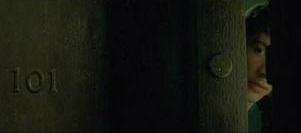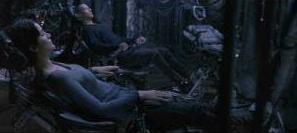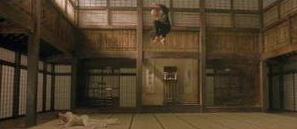The Symbolic Use Of Color

In "The Matrix"
Author: Dew
Property of
Dew's Matrix Fan Page
(http://www.oocities.org/hollywood/theater/9175)
IMPORTANT: For those of who are writing Matrix papers for school and wish to use my site as a source remember that all the articles on this site are copyrighted. This means that you MUST list Dew's Matrix Fan Page (http://www.oocities.org/hollywood/theater/9175) as a source and site all references or quotes according to your teacher's requirements. Keep in mind that while I done my best to ensure the accuracy of this site's contents, I do not and can not take responsibility for any errors or omissions. In another words, you should not rely on this site's information without first checking its accuracy.
And while it is not an academic requirement, I strongly encourage you to
email me and tell me if you have used, or plan to use, my articles as a source in a paper. I ask for your feedback because it is the only way that I know that my site is useful and helps me gauge what kinds of new articles are needed.
WARNING: Under no circumstances is this site's information/articles to be reproduced or transmitted in any form or by any means, in whole or in part, without prior permission.

Green
The use of green in this movie is symbolic of the matrix code.
All the scenes inside the
matrix (particularly those before Neo is taken out of the pod) were filmed with green tint to
them. In fact, in the words of the Wachowski brothers, this use of green tint "...was a whole motif inspired by the phosphorous green of old PCs."
Note that many of the objects inside of the matrix are green as well.
In color psychology, green is sometimes associated with sickness, decay, disease, and impending death. ("You're looking a little
green, today.") Note that green is the color of mold
and Mr. Yuk.
The color green is also associated with naivety.
Often times people will refer to
someone as being "green" when they don't know
anything about a topic. All the people inside the
matrix don't have a clue that they are really living
in a false reality and that they are actually
prisoners.
Green stands for jealousy
too. (To be "green with envy"; to be
"green-eyed.")
Cypher is envious of Neo's relationship with Trinity and Morpheus.
In Christianity, green
is the color of the Trinity. (See my page on "Name and Numbers" for more information on the Christian aspects of this movie.)

Blue
Use of blue is symbolic of the real world. In
fact, all the scenes in the real world have a
overwhelming bluish cast to them. Many of the objects
inside of the matrix are blue also.
In color psychology, blue is considered
to be a peaceful, spiritual color because the sky and
the oceans are blue. In addition, blue is
thought
to be a mentally and physically therapeutic color. It
heals,
soothes, and relaxes.
When we first see Neo in the real world, he is in poor shape physically and mentally. (In fact, he even asks Morpheus if he is dead!) Morpheus calmly tells Neo to rest and the Neb crew begin to work on his muscles, which have atrophied from being in the matrix pod. These "healing" scenes are filled with blue objects and they have a general blue aspect to them.
Blue is also symbolic of hope and inspiration. In religious symbolism, it stands for truth as
well. When Neo sees Trinity and Morpheus for the first time in the real world, they are surrounded by a misty bluish light. Morpheus tells Trinity that they have "found him." When Trinity questions this by saying, "I hope you are right," he counters with "I don't have to hope."
In psychology, blue is a "cool" color. In the
real world, it is very cold because the humans
have "scorched the sky." In fact, the coldness of the real world is one of reasons why Cypher wants to go back to living in the matrix.
Dark blue (or too much blue) is also associated
with depression, dejection, and sadness. This is
where the
saying, "I'm feeling a little blue today" is from.
Cypher has grown very tired of the real world and he is unhappy with the harsh reality of it.
Blue can also signify extreme
frustration, irritation, or discouragement. (To
become "blue in the face.") Cypher expresses great
irritation with Morpheus and his role on the ship.

Indigo
Indigo is a color ranging from deep violet blue
to a dark grayish blue. Overall, we see shades of
indigo in the real world mixed in subtly with the
blues.
Indigo holds all the qualities of blue, plus it also stands for knowlege, power,
intution, and integrity. These themes are all present in the real world as well.

Orange
Orange (the color of the sun and fire) emits a
warm,
positive feeling and suggests enduring energy, strength, and
vitality. In the Oracle's kitchen we see a lot of orange. The Oracle's presence and demeanor reflects these "orange" qualities. She seems to be a warm, positive person who doesn't let too much bother her. She makes you feel really at ease with her.
Orange also represents drive, ambition, and
enthusiasm. We see a lot of orange in the Dojo scene as well. Here, Morpheus really moves into the role of a determinated and confident teacher while Neo reveals himself to be a student eager to rise to the challenge.
In "Understanding The Dreams You Dream," Ira Milligan states that orange is representive of danger and great jeopardy. It is the Oracle scene the the Oracle predicts the death of either Neo or Morpheus.

Red
Red is the color of aggression, anger, danger, sin, and war. Cypher wears a dark red shirt in the real world. It also has a large hole in it where is his
heart is located. Furthermore, the color red is also associated with the devil and evil. In this case, the agents are representive of evil as well as Cypher through his alliance with them. Since medieval times, the Devil has been
often depicted wearing red clothes or having red
skin.
Red is also associated with sexuality, love,
passion, and
lust.
Cypher (while wearing that red shirt) confesses his love to Trinity. He suggests that this feeling has ben around for a long time and that he is frustrated by the fact that he can't have her because he knows she is in love with Neo. As Joe Pantoliano explains in the July 1999 issue of Starlog, "I've got an enormous johnson for Trinity. I'm infatuated with her. I want desperately to have her."
In fact, it is this unrequited love that is one of the reasons why he decides to become a traitor. By being placed back into the matrix pod and having his memory erased, he'll be able to forget about the woman he can't have and the fact that he betrayed her, too.
The woman in red catches Neo's eye in the agent training program. By the way, a "red
herring "is
something intended to divert attention from the real
problem or matter at hand." The whole matrix world is really just one big red herring.
There is
also a woman wearing a red coat when Neo is taken out
of this office building by the agents. She appears to be the only person in that scene who isn't wearing
white or black so she stands out.
The color of blood, red also stands for life, death, and war (the shedding of blood.)
Cypher's steak is a blood red. It is during this meal that he makes a decision that will result in the deaths of several people, including his own.
The inside
of the matrix pods are red.
The pill that Neo takes (which results in his "second birth") is red.
The chairs that the Neo and Morpheus sit in during their two talks are red. Both conversations were about the matrix and the war between the humans and machines.
We see Neo and Trinity bleeding after their confrontations with the agents. Neo also bleeds because of his fight and fall in the computer simulation programs.

Black
Note that most of the characters while in the
matrix wear black. The term "black
out" refers to to a temporary
loss of consciousness or memory. While in the matrix, those plugged in are unconscious or sleeping. After Neo is faced with the knowledge of what the matrix is, he blacks outs.
Black clothing is powerful, intimidating,
dramatic, and has a sense of elegance to it. It
indicates inner strength, independence, a strong
will, and determination.
According to psychologists, an attraction to
black may indicate a need for emotional support. (An
example often cited is the wearing-all-black phase
that many teenagers go through.)
Black is a color of mystery, secrets, and
intrique. When we see Trinity for the first time (who
is dressed in all black and in a dark room) we
we don't know what her intentions
are or if she is going to be a villian or a hero in the story.
Black is associated with darkness, death,
rememberance, and mourning. In many ways, the freed
humans in "The Matrix" are in a state of mourning.
They realize what the earth used to be like and they
want control of it back.
The color black represents
fear, anxiety, and hostility, too. When the freed
humans reenter the matrix, they are always in a state
of fear and they are anxious about getting back to the real world as soon as possible.
Black is also associated with evil and
wickedness.In many cultures, a black cat crossing
your path is a sign of bad luck.
Nighttime or darkness is also symbolic of ignorance, a secretive or hidden dimension, the unknown, the power of evil, and stealth (as in "they crept in under the cover of darkness").

Silver
Silver is symbolic of the
unconscious and often is used with gold (symbol of conscious) to remind of us of these opposing concepts. The bullets that Neo stops in mid-air are silver as is Dujours's necklace.
As the mirror
travels up Neo's arm it changes at times from a silver (sign of
unconsciousness) to a gold (symbol of consciousness)
color as it picks up the light in the room. This is
very symbolic as Neo is moving from an unconscious
state to a conscious one.
When Neo is shooting into the room where Morpheus is being held, we see gold gold and silver (bullets and casings) falling to the ground.
The Oracle's waiting room has gold and silver (the spoons are silver and the cups on her stand are all gold.)
Due to its reflective qualities, silver acts as a mirror and therefore takes on the same symbolic qualities as mirrors in this movie-- the idea of the different levels of reality ("Worlds within worlds") being shown at once.
In addition, silver represents eloquence or persuasiveness as well. (A person who
has a "silver tongue" possesses these
qualities.) Note that in the scenes where a character
makes (or attempts to make) a convincing speech,
there is at least one silver object in the room.
Agent Smith's "Human" Speech: The chair that
Agent Smith pulls over to Morpheus is all
silver. Other silver objects in that room include: Morpheus's handcuffs and the needle.
Morpheus's "Splinter In The Mind" Speech: The
pill container that Morpheus turns around and around
is silver.
Morpheus's "How Could You Tell The Difference"
Speech: Switch's tube top is
silver.
Agent Smith's "Unable To Speak" Speech: The
table, the chairs, and the bug case are silver.
Switch's "Copper Top" Speech: Her gun is
silver as well as her nail polish.
The Oracle's "Know Thyself" Speech: The radio on her refrigerator, the pot on her stove, and a cup on her counter are silver.
Neo's "I Can Feel You Now" Speech: The phone booth is silver as well as the front of the phone.
It is
also regarded as a symbol of persistence and optimism (look for the "silver" lining). Switch wears silver tubetop and nail polish at one point. The bomb case and the bomb itself are silver. The Oracle's door knob is silver.

Yellow/Gold
Yellow is considered to be the color of the mind. It is also representative of clarity, caution
("stop light" yellow), fear and cowardiness. In fact, a person who is cowardly is often referred to as
"yellow-bellied" or a "yellow
dog."
We see the inside lining of Neo's jacket when he
is in office cubicle trying to get away from the
Agents and then again when he is outside on the
window ledge trying to reach the
scaffold.
As for the yellow underside
of Agent's Smith's jacket, we see it when he is
fighting bullet-stopping Neo, when Neo kicks Agent
Smith and he goes flying down the hallway, and when
Neo enters Agent Smith's body.
A shade of yellow, gold is the color of the
conscious. It stands for wisdom, healing, and
illumination. When Neo bursts through the body of
Agent Smith, it is in a flood of brillant white-gold
light. We also see gold in the Oracle's waiting room.

White
White is the color of hope, faith, confidence,
and
enlightenment. In China, wearing white is a symbol of mourning.
In the matrix, Switch is the only Neb crew member to wear white. I think that this is, in part, because of her name--she "switches" from black to white. Also, I think it is done because white makes her stand out.
White is also associated with purity, innocence,
goodness, and perfection. (In the western world, brides wear white to reflect these qualities.) When Morpheus first plugs Neo into a computer simulation, the screen is totally white and void of
anything. It represents the fact that the loading program has endless possibilities and uses.

Black & White Together
Black and white together represents a lack of
color, and therefore, is symbolic of conformity and
unindividuality. Note that in the matrix or the
matrix computer simulations, almost everyone is
wearing black or white or a combination of both.
When someone
says
that they want something in "black and white," is
means that they want absolute terms with no gray or
uncertain areas. In this movie, there some things that are either one way or another. For instance, something is either real or isn't real. The problem is how you come to that conclusion.
Putting white and black together represents an
unity or conflict between two opposite
things.
Many of the matrix shots are
predominately filmed in shades of black and white or
have black and white objects in them. (Keep in mind
that the blacks and whites often times have that
greenish cast to them.) Here are just some
examples:
Dojo Scene: Morpheus is wearing a black outfit
with white trim; Neo is wearing a off-white outfit
with black trim
Lafayette Hotel: The floor looks like a black and white checkerboard. It is here that the two sides (humans verus machines) duke it out.
Lobby Scene: When Neo first enters the lobby, the
room is all white and black. In fact, Neo is wearing
all black and the guards are wearing white
shirts.
The Group In The Matrix Scene: The room is mostly
black with a touch of white (Switch's outfit.)
Morpheus's Jump: The building and sky appear
mostly white while Morpheus is dressed in
black.
The Agent Training Program: The
crowds is wearing all black and white--except for the
woman in the red dress. As the Wachowski brothers also point out, "...all the clothes [in that crowd scene] are based on black and white costumes, like nuns, chefs, brides, sailors."
Dujour is
wearing all black but her rabbit tattoo is
white.
Neo Meets Trinity At The Club: This scene is predominately black. (Mainly because the characters are wearing all black, both have black hair, and there isn't really any other colors in the
scene.)
The Trinity Roof Top Scene: Mostly black and
white. The characters are dressed in all black and
the roof and lights below appear white/dirty white.
There is a void of any other colors.
The Trinity Cop Fighting Scene: The walls appear very green at times but the
room appear very dark. All the characters in the room are wearing black.
The Agents and
The Truck: Mostly black and white scene.
The use of black and white togther
in many of these scenes helped to create a "comic
book" feeling to the movie.
Furthermore, the use of black and white reminds the
viewer of the many opposing forces/themes at work in "The Matrix." In Taoism, this is referred to as "the yin and the yang--the opposing, but at the same time, balancing and interating forces within nature." Here are some examples in "The Matrix:"
€real life vs the matrix
€truth vs lie
€life vs death
€conscious vs unconscious
€good vs evil
€wisdom vs ignorance
€humans vs machines
€freedom vs slavery
€free will vs determinism
€peace vs war
€reality vs illusion
€real vs unreal
€awake vs asleep
€belief vs disbelief
Sources include: Starlog Magazine (July 1999), "A Dictionary
Of Dream Symbols" by Eric Ackroyd, "The Illustrated
Book Of Signs & Symbols" by Miranda Bruce-Mitford,
"The Secret Language of
Dreams" by David Fontana, "Understanding The Dreams you Dream" by Ira Milligan, "Random House Webster's
Dictionary", "Cinefex"--October 1999, the Wachowski Chat Transcript at the Official Matrix Website, and "The Compact Guide To World Religions" by Dean C. Halverson.
© Copyright 1999-2003 by Dew, owner of Dew's Matrix Fan Page. No part of this text may be written, copied or
reproduced without express written consent.



Return To Home
Page













